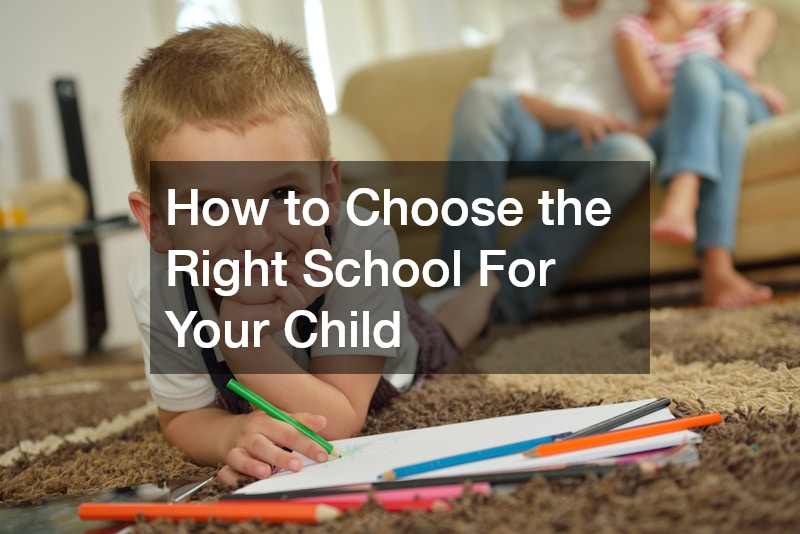Choosing the right school for your child is one of the most important decisions a parent can make. Education plays a crucial role in shaping a child’s future, and finding the best environment for learning, personal development, and social growth is essential. With so many options available, from public schools to private institutions, charter schools, and even homeschool programs, it can be overwhelming to decide which path is best. This guide will help you navigate the process and make a more informed decision.
1. Consider Your Child’s Needs
Every child is unique, and understanding your child’s learning style, strengths, and areas where they need support will guide your school selection. Does your child excel in structured environments, or do they thrive in more flexible, creative settings? Some children may need extra support in subjects like math or reading, while others may benefit from enrichment programs in the arts or sciences.
If your child requires additional academic help, you might want to consider a school that works closely with a local tuition centre to provide supplementary education.
2. Evaluate the Curriculum and Academic Programs
Schools offer different curricula and approaches to education, from traditional academic programs to Montessori, International Baccalaureate (IB), and STEM-focused schools. Take time to understand the core values of each curriculum and whether it aligns with your child’s educational goals. For instance, if you’re looking for an academic program that emphasizes critical thinking and inquiry-based learning, an IB school might be the best fit. On the other hand, if your child has a particular interest in science and technology, a STEM-focused school could offer the specialized programs needed to cultivate their passion.
3. Visit Schools and Attend Open Houses
Open houses and school tours provide invaluable insights into the school environment and culture. When visiting, observe the classrooms, the way teachers interact with students, and the overall atmosphere. Are the students engaged? Is the learning environment welcoming and inclusive? During your visit, speak with teachers and administrators to get a sense of how the school addresses individual learning needs and fosters personal growth. Ask about class sizes, extracurricular activities, and the overall academic philosophy. A personal tour is also an excellent opportunity to ask questions and clarify any concerns.
4. Look Beyond the School’s Marketing
Every school will highlight its strengths, but it’s essential to dig deeper to get a full picture. Ask for feedback from other parents and speak to current and former students. Students who are no longer affiliated with the school can offer an unbiased view of the school’s strengths and weaknesses. Pay attention to what they say about the teachers, the learning environment, and how the school handles challenges. Understanding how a school deals with problems or difficult situations is a crucial factor in determining its true character.
5. Consider Extracurricular Activities and Enrichment Programs
While academics are critical, extracurricular activities play an essential role in your child’s development. These programs allow students to explore their interests outside of the classroom and can contribute to personal growth, teamwork, and leadership skills. When choosing a school, look at what clubs, sports, arts programs, and other activities are available. Schools that partner with outside organizations, such as a nearby tuition centre, may also offer academic clubs, tutoring, and after-school programs to support students’ educational development.
6. Class Size and Teacher-to-Student Ratio
Class size can have a significant impact on your child’s learning experience. Smaller classes often allow for more individualized attention from teachers, helping students receive the support they need to succeed. Large class sizes may lead to students feeling overlooked or struggling to get the help they require. When evaluating schools, inquire about the average teacher-to-student ratio and how the school ensures that every child receives personalized attention.
7. Assess the School’s Approach to Discipline and Safety
Understanding a school’s discipline policies and its approach to student safety is essential. How does the school handle behavioral issues? Are there clear and fair policies in place for bullying, peer conflicts, and discipline? A safe and supportive environment is vital for a child to thrive, so ensure that the school has a solid plan in place for addressing these issues. It’s also helpful to observe how staff members interact with students during your visit, as this can give you a sense of the school’s culture and overall approach to discipline.
8. Location and Transportation
Location is a practical consideration that can greatly impact your day-to-day life. How far is the school from your home or workplace? Is transportation provided, or will you need to arrange your own? Proximity to the school can be important, especially if your child will be involved in after-school activities. Choosing a school within a reasonable distance can make it easier for you and your child to participate fully in school events and programs.
9. Financial Considerations
If you’re considering a private school or a specialized academic program, tuition fees can be a significant factor. Be sure to review the cost of attendance and any additional fees for extracurricular activities, materials, or programs. Some schools may offer financial aid, scholarships, or payment plans, so explore all your options before making a decision. Additionally, consider the cost of transportation, uniforms, and school supplies, as these can add up over time.
10. Trust Your Instincts
Finally, trust your gut feeling. After researching, visiting, and gathering feedback, you will have a sense of which school feels like the right fit for your child. Trust your instincts and choose the school that aligns best with your child’s needs, your family values, and your overall educational goals.
In conclusion, choosing the right school for your child requires careful consideration of their individual needs, the school’s academic and extracurricular offerings, and its environment. Whether you’re selecting a school that works with a tuition centre for extra academic support or a school known for its holistic approach, ensuring a positive and supportive learning environment will help your child thrive.
.




